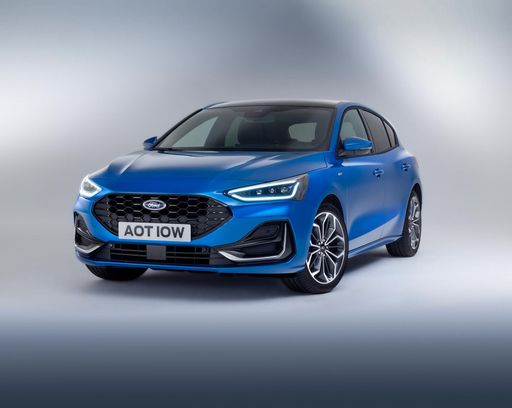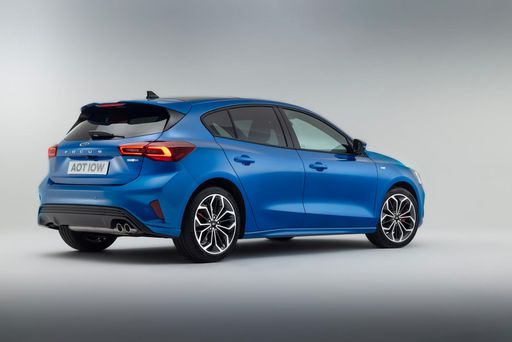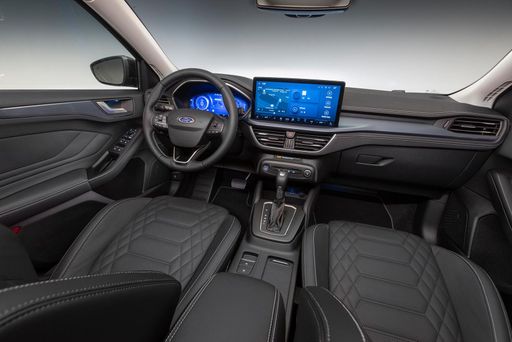The automotive market is witnessing an exciting duel between two highly popular hatchbacks: the Ford Focus and the Peugeot 208. Both models have distinct characteristics and target different segments of drivers. This article will delve into a comprehensive comparison of their technical aspects, innovations, performance metrics, and overall appeal.
Ford Focus vs Peugeot 208 - Differences and prices compared
Compare performance (280 HP vs 156 HP), boot space and price (27500 £ vs 20700 £ ) at a glance. Find out which car is the better choice for you – Ford Focus or Peugeot 208?
Design and Dimensions
In terms of design, both the Ford Focus and Peugeot 208 exude a modern aesthetic. The Focus measures 4392 mm in length and boasts a width of 1825 mm, making it slightly larger than the Peugeot 208, which is 4055 mm long and 1745 mm wide. The Focus offers more interior space and a trunk capacity of 392 liters compared to the 208's 309 liters, making it a practical choice for families and those who require more cargo room.
Engines and Performance
When it comes to powering these hatchbacks, the Ford Focus offers a variety of engine options. It includes petrol mild-hybrid (MHEV), traditional petrol, and diesel engines, providing a power range from 115 HP to an impressive 280 HP. In contrast, the Peugeot 208 also features petrol and MHEV engines, along with an all-electric option, offering a power range from 101 HP to 156 HP. The Focus outshines the 208 in terms of maximum power, though the 208's electric variant is compelling for those seeking sustainability.
In terms of acceleration, the Focus outperforms the 208, with a range of 0-100 km/h times from as low as 5.7 seconds for its highest power variant. The Peugeot 208, on the other hand, achieves a best time of 8.3 seconds, making it a bit slower but still competitive for urban driving scenarios.
Fuel Efficiency and Environmental Impact
Fuel efficiency is essential for many modern car buyers. The Focus has a consumption range of 4.9 to 8 L/100 km, depending on the engine variant. The Peugeot 208 leads in efficiency with consumption figures ranging from 4.7 L/100 km for the petrol variants to 16.1 kWh/100 km for its electric model, showcasing its commitment to green driving.
CO2 emissions are a vital statistic, and both car manufacturers showcase competitive figures. The Focus emits between 117 to 183 g/km, while the Peugeot 208 boasts cleaner outputs with figures ranging from 0 g/km for its electric version to 121 g/km for petrol engines, placing it in a more favorable CO2 efficiency class overall.
Transmission and Driving Experience
Ford offers diverse transmission options with manual, automatic, and dual-clutch automatic gearboxes, enhancing flexibility for various driving preferences. The manual transmission variants give enthusiasts a more engaging driving experience. In contrast, the Peugeot 208 primarily relies on automatic and manual gearboxes, including a reduction gearbox for its electric model, making it easy to drive in urban environments.
Interior, Technology, and Safety
Both vehicles prioritize interior comfort and technology. The Focus features a spacious cabin with intuitive infotainment systems, while the Peugeot 208 sports a stylish interior with its i-Cockpit technology, which provides a head-up display and advanced connectivity options. In the tech department, both models are equipped with modern safety features such as lane-keeping assist, adaptive cruise control, and emergency braking systems, ensuring a secure driving experience.
Final Thoughts
Ultimately, the choice between the Ford Focus and Peugeot 208 will boil down to personal preferences and needs. If performance, cargo space, and a variety of powertrain options are high on your list, the Focus is a strong contender. However, if fuel efficiency, urban agility, and eco-friendly driving are paramount, the Peugeot 208 stands out as an excellent choice. As both manufacturers continue to innovate and improve their models, car enthusiasts can expect thrilling developments in future generations.
Here’s where it gets real: The technical differences in detail
Costs and Efficiency:
When it comes to price and running costs, the biggest differences usually appear. This is often where you see which car fits your budget better in the long run.
Peugeot 208 has a evident advantage in terms of price – it starts at 20700 £ , while the Ford Focus costs 27500 £ . That’s a price difference of around 6832 £.
Fuel consumption also shows a difference: Peugeot 208 manages with 4.50 L and is therefore minimal more efficient than the Ford Focus with 4.90 L. The difference is about 0.40 L per 100 km.
Engine and Performance:
Power, torque and acceleration say a lot about how a car feels on the road. This is where you see which model delivers more driving dynamics.
When it comes to engine power, the Ford Focus has a significantly edge – offering 280 HP compared to 156 HP. That’s roughly 124 HP more horsepower.
In acceleration from 0 to 100 km/h, the Ford Focus is significantly quicker – completing the sprint in 5.70 s, while the Peugeot 208 takes 8.30 s. That’s about 2.60 s faster.
In terms of top speed, the Ford Focus performs slightly better – reaching 250 km/h, while the Peugeot 208 tops out at 200 km/h. The difference is around 50 km/h.
There’s also a difference in torque: Ford Focus pulls distinct stronger with 420 Nm compared to 270 Nm. That’s about 150 Nm difference.
Space and Everyday Use:
Cabin size, boot volume and payload all play a role in everyday practicality. Here, comfort and flexibility make the difference.
Both vehicles offer seating for 5 people.
In curb weight, Peugeot 208 is slightly lighter – 1165 kg compared to 1330 kg. The difference is around 165 kg.
In terms of boot space, the Ford Focus offers somewhat more room – 392 L compared to 352 L. That’s a difference of about 40 L.
In maximum load capacity, the Ford Focus performs a bit better – up to 1354 L, which is about 191 L more than the Peugeot 208.
When it comes to payload, Ford Focus clearly perceptible takes the win – 560 kg compared to 430 kg. That’s a difference of about 130 kg.
Who wins the race in the data check?
The Ford Focus is far ahead overall in the objective data comparison.
This result only shows which model scores more points on paper – not which of the two cars feels right for you.
Costs and Consumption
View detailed analysis
Engine and Performance
View detailed analysis
Dimensions and Body
View detailed analysis

Ford Focus
Ford Focus
The Ford Focus remains a clever all‑rounder that balances sharp handling with everyday comfort, making it a strong choice whether your commute is city streets or country lanes. Its practical cabin and sensible running costs mean you’ll spend more time enjoying the drive and less time worrying about ownership, with a playful streak underfoot that keeps things interesting.
details


Peugeot 208
The Peugeot 208 feels like a city-savvy fox: compact, stylish and surprisingly grown-up, with a cabin that punches above its weight and enough personality to make daily commutes a little less boring. It’s a smart pick for buyers who want chic practicality without the showroom bluster — easy to park, thrifty to run and oddly fun when the road tightens up.
details



Costs and Consumption |
|
|---|---|
|
Price
27500 - 42700 £
|
Price
20700 - 35200 £
|
|
Consumption L/100km
4.9 - 8 L
|
Consumption L/100km
4.5 - 5.2 L
|
|
Consumption kWh/100km
-
|
Consumption kWh/100km
14.1 - 15.4 kWh
|
|
Electric Range
-
|
Electric Range
362 - 432 km
|
|
Battery Capacity
-
|
Battery Capacity
46 - 51 kWh
|
|
co2
117 - 183 g/km
|
co2
0 - 117 g/km
|
|
Fuel tank capacity
52 L
|
Fuel tank capacity
44 L
|
Dimensions and Body |
|
|---|---|
|
Body Type
Hatchback
|
Body Type
Hatchback
|
|
Seats
5
|
Seats
5
|
|
Doors
5
|
Doors
5
|
|
Curb weight
1330 - 1529 kg
|
Curb weight
1165 - 1530 kg
|
|
Trunk capacity
392 L
|
Trunk capacity
309 - 352 L
|
|
Length
4382 - 4397 mm
|
Length
4055 mm
|
|
Width
1825 - 1844 mm
|
Width
1745 mm
|
|
Height
1438 - 1482 mm
|
Height
1430 mm
|
|
Max trunk capacity
1354 L
|
Max trunk capacity
1118 - 1163 L
|
|
Payload
495 - 560 kg
|
Payload
380 - 430 kg
|
Engine and Performance |
|
|---|---|
|
Engine Type
Petrol MHEV, Diesel, Petrol
|
Engine Type
Petrol, Electric, Petrol MHEV
|
|
Transmission
Manuel, Automatic
|
Transmission
Manuel, Automatic
|
|
Transmission Detail
Manual Gearbox, Dual-Clutch Automatic, Automatic Gearbox
|
Transmission Detail
Manual Gearbox, Reduction Gearbox, Dual-Clutch Automatic
|
|
Drive Type
Front-Wheel Drive
|
Drive Type
Front-Wheel Drive
|
|
Power HP
115 - 280 HP
|
Power HP
101 - 156 HP
|
|
Acceleration 0-100km/h
5.7 - 11.8 s
|
Acceleration 0-100km/h
8.3 - 10.9 s
|
|
Max Speed
186 - 250 km/h
|
Max Speed
150 - 200 km/h
|
|
Torque
170 - 420 Nm
|
Torque
205 - 270 Nm
|
|
Number of Cylinders
3 - 4
|
Number of Cylinders
3
|
|
Power kW
85 - 206 kW
|
Power kW
74 - 115 kW
|
|
Engine capacity
999 - 2261 cm3
|
Engine capacity
1199 cm3
|
General |
|
|---|---|
|
Model Year
2022 - 2024
|
Model Year
2023 - 2025
|
|
CO2 Efficiency Class
D, G
|
CO2 Efficiency Class
D, A, C
|
|
Brand
Ford
|
Brand
Peugeot
|
What drive types are available for the Ford Focus?
Available configurations include Front-Wheel Drive.
